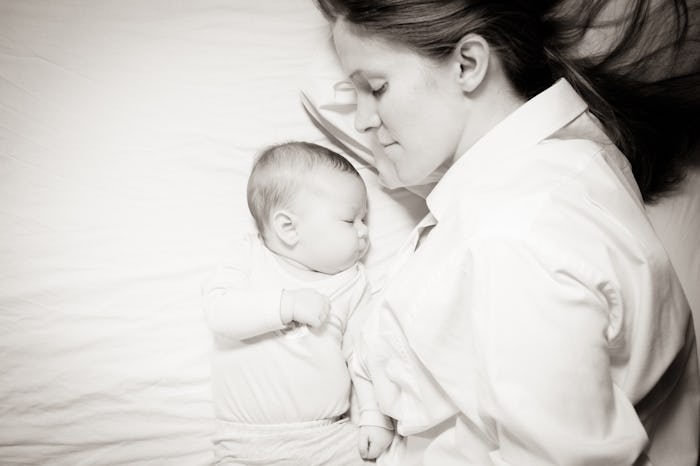Life

9 Myths About Co-Sleeping That You Can Put To Bed
Who wants to sleep alone? Not me, and chances are your baby doesn't want to either. The family bed is becoming more and more mainstream, no longer reserved for hippie parents or stalwart attachment parenting devotees. Still, myths about co-sleeping prevail, and I'm not sure why.
“If you were a baby, where would you want to sleep?” Dr. William Sears asked in a report filed by Fox News. “In a crib alone in a dark room behind bars or nestled close to your favorite person in the whole world?" Still, babies don't always get what they want, and they shouldn't. Setting boundaries is one of the most important things you can do you can do as a parent, acknowledged Child and Family Support Services. But just because you're setting boundaries, doesn't mean you have to skip your desire to co-sleep if that's what you want to do.
And, according to science, there's a biological imperative that backs up your desire to be near your baby during nocturnal hours, and likewise, for your baby to want to be near you, or so indicated a study published by Professor James J. McKenna, director of the Mother-Baby Behavioral Sleep Laboratory at the University of Notre Dame. With that in mind, the following myths about co-sleeping are busted, so you can finally put them to bed.
Myth #1: Co-Sleeping Makes Your Kid Needy Later In Life
Fox News reported that co-sleeping can boost a kid's confidence later in life. Dr. Susan Markel told Fox News that the kind of connection fostered during co-sleeping can create a sense of security in your child.
Myth #2: Co-Sleeping Might Cause Your Baby To Suffocate
No mother wants to think about this terrifying prospect. So here are the facts. In the same interview with Fox News, Dr. William Sears, said co-sleeping facilitates being in touch with what's going on with your baby during sleep. "Mothers are going to sense something is going on," Sears said, about the possibility of a baby in duress.
Myth #3: Co-Sleeping Increases Risks For SIDS
In his book, SIDS: A Parent's Guide to Understanding and Preventing Sudden Infant Death Syndrome, Professor James J. McKenna, director of the Mother-Baby Behavioral Sleep Laboratory at the University of Notre Dame, reported on over 250 scientific references that confirm the safety of breathing patterns in babies who co-sleep with their parents. So, there's no evidence that co-sleeping increases risks of SIDS.
Myth #4: Co-Sleeping With An Infant Means Sharing A Bed With Your Baby
According to McKenna, infant-parent co-sleeping has its own set of rules. Infants should always sleep alongside the mother on a separate surface rather than in the bed.
Myth #5: Co-Sleeping Can Go Down In Any Kind Of Bed
McKenna also noted that there are certain types of beds that should be avoided when co-sleeping with a baby. For example, waterbeds should be avoided because they can be dangerous to infants. Your mattress should always tightly line up to the bed-frame to leave no gaps or space for your baby to slip through.
Myth #6: Co-Sleeping Is Practiced Only By Americans
McKenna told Parenting that this is another myth, and that many cultures worldwide practice co-sleeping, especially in Asia.
Myth #7: Co-Sleeping Causes Behavioral Problems In Kids Later In Life
Although you may think that kids who have co-slept with parents are used to more attention, which could lead to behavioral problems later in life, there's no scientific data to back this up. In fact, according to the United States National Library of Medicine National Institutes of Health, there is no evidence that co-sleeping leads to bad behavior.
Myth #8: Co-Sleeping Makes Sleep Harder For New Moms
Actually, the opposite is true. McKenna told The Bump that 80 percent of mothers who breastfeed co-sleep. Why? You don't have to get up and to breastfeed, which is more likely to disturb your sleep cycle. Plus, according to the aforementioned Fox News article, moms who do find breastfeeding easier and have an increased milk supply.
Myth #9: Co-Sleeping Means Having A Sexless Marriage
Sure, bedtime is when a lot of couples do it, but it's not the only time to have sex when you have kids. Being the creative parent you are, you can figure out how to have sex with kids in the house any time of day.